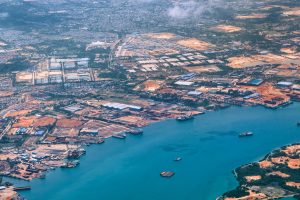On May 1, 2023, the MV Pablo caught fire off Malaysia’s coast and exploded, burning out completely. Fortunately, the tanker was empty of oil, thus limiting the environmental damage caused by the accident. Yet three people were killed and four were seriously injured in the explosion.
The MV Pablo is part of the world’s growing fleet of “dark” or “shadow” tankers. These are aging and anonymously owned tankers that help Russia, Venezuela, and Iran evade sanctions against their oil exports.
Many of these tankers are substandard and don’t comply with international marine safety rules. This increases the risk of dangerous accidents and oil spills significantly, with disastrous consequences for seafarers, coastal states, and the marine environment. Urgent action is needed to contain this threat.
The Threat of Shadow Shipping
The MV Pablo was built in 1997, and by the time of its explosion was far beyond the age at which most tankers are scrapped. Registered in Gabon, a popular flag of convenience for sanctions-busting vessels, it was owned by a single-ship shell company in the Marshall Islands, with scant information on its real owners. The vessel, which is still wrecked off Malaysia’s coast, reportedly did not have adequate insurance coverage.
Hundreds of these tankers – up to 10 percent of the global oil trading fleet – currently carry sanctioned oil around the world.
Southeast Asia is a major hub for the shadow tanker fleet. Many shadow tankers pass through the Malacca Strait on their way to China, one of the largest consumers of sanctioned oil. They conduct risky ship-to-ship oil transfers off Singapore, Malaysia, and Indonesia.
The MV Pablo is in fact not the first shadow tanker incident in the region. In November 2022, for example, the 2001-built shadow tanker Young Yong ran aground in Indonesian waters close to a Singapore gas pipeline.
Accidents involving shadow tankers have also increased globally. A Reuters investigation has identified “eight groundings, collisions, or near misses involving tankers carrying sanctioned crude or oil products” in 2022, including incidents off China, Cuba, and Spain.
Countries have started to discuss the risks of shadow shipping at the International Maritime Organization, the major regulatory body for the shipping industry.
However, they have not made sufficient use of the United Nations Convention on the Law of the Sea (UNCLOS) to address the problem. Countries such as China and Vietnam claim that UNCLOS allows them to restrict the militarization of their EEZs – an interpretation that other nations reject. Yet there is no question that UNCLOS allows coastal states to ban dangerous shadow tankers from their waters.
The Law of the Sea
UNCLOS ensures freedom of navigation for merchant shipping – including sanctions busters – but it also allows coastal states to regulate shipping activities and to prevent marine crimes and accidents that could cause pollution and threaten their economies.
Under UNCLOS, states enjoy nearly full sovereignty in their territorial waters that extend up to 12 nautical miles (22.2 kilometers) from their coast. They may regulate the passage of foreign vessels for environmental, navigation safety, or security purposes – as long as their measures adhere to general international rules and standards and do not discriminate against any ships or cargoes.
In international straits, even though foreign vessels are granted the right of transit passage, bordering states can adopt regulations to ensure safe navigation. In the Malacca Strait, for example, bordering states enforce regulations to prevent accidents and other practices that could damage their marine environment.
In the exclusive economic zone (EEZ), a zone that extends up to 200 nautical miles (370.4 kilometers) from a country’s coast, states have jurisdiction over the protection of the marine environment. Concerning marine pollution, state practice is diverse, ranging from prior authorization before entry of foreign vessels into their EEZs to the designation of specific areas where entry and passage are regulated.
The 2005 Malaga Agreement between France, Spain, and Portugal -signed after the Erika incident in 1999 and the Prestige incident in 2002 – is the most striking case of regulations aimed at limiting freedom of navigation to prevent dangerous shipping activities. Under the agreement, the three countries inspect and, in some cases expel substandard vessels from their EEZs. France alone has turned away 28 ships from its waters following the adoption of the agreement.
Regional Cooperation
UNCLOS, in other words, is a powerful tool in the fight against dangerous shipping practices. It allows Southeast Asian states to deny aging and substandard shadow tankers access to their EEZs and coastal waters – including the Malacca Strait.
Yet Southeast Asian countries need to enhance cooperation to use UNCLOS to protect their waters effectively. This includes the establishment of vessel monitoring and inspection schemes, sharing information on suspicious shadow tankers and activities – such as ship-to-ship oil transfers – and developing joint standards for enforcing maritime safety rules in the region.
Southeast Asian countries should also work with the International Maritime Organization and other countries, including China, to develop a global framework to address the growing risk from shadow tankers.

































